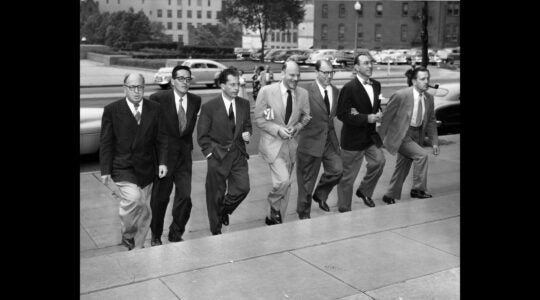In a dramatic shift, the Joint List alliance of Arab-majority parties recommended Blue and White leader Benny Gantz for prime minister on Sunday, seemingly paving the way for the centrist party to get the first crack at assembling a coalition.
The decision marked the first time Arab parties — separately or together — have recommended a mainstream Zionist politician since 1992, when they supported Labor Party leader Yitzhak Rabin, who campaigned on peace with the Palestinians.
“We have seen the most difficult election since 1948 in terms of the incitement against Israel’s Arab citizens,” Joint List leader Ayman Odeh told President Reuven Rivlin upon issuing his party’s recommendation. “We have been turned into a group that is not legitimate in Israeli politics. If we are being pushed out, we will take our rightful place. For us, the most important thing is to remove Benjamin Netanyahu from power.”
“So we will recommend Benny Gantz to form the next government,” added Odeh. The Joint List alliance made the announcement at roughly the same time Odeh published an opinion piece on the New York Times website speaking of the move.
Fellow lawmaker Ahmad Tibi said the decision was made despite the party’s reservations about Gantz, a former IDF chief of staff who commanded Israel’s 2014 war against terrorist groups in the Gaza Strip.
“Benny Gantz is not our cup of tea. We have a lot of criticism of him, specifically regarding Gaza,” said Tibi. “But when we told our public that we would do all we can to remove Netanyahu from power, we realized that we would need to take a bold step.”
With the endorsement of the party, which holds 13 of the Knesset’s 120 seats, Gantz is expected to receive 57 recommendations for the premiership, compared to 55 right-wing and religious votes for Prime Minister Benjamin Netanyahu. Blue and White also won two seats more than Likud in Tuesday’s election, reinforcing the prospect that Gantz will likely be given first chance at building the next government.
Netanyahu on Sunday night condemned the Joint List’s support for Gantz as the Arab alliance met with Rivlin to issue their recommendation.
“Citizens of Israel, this happened just as we warned. The Arab Joint List recommend Benny Gantz for prime minister,” he said in a video statement. “There are two possibilities now: either a minority government will be formed that relies on the those who reject Israel as a Jewish and Democratic state and glorify terrorists that murder our soldiers and citizens, or a broad national government will be formed. I know what the answer is and so do you, and therefore I’ll do whatever I can to form a broad national unity government. There is no other solution.”
The president has the power to appoint one of the 120 MKs elected on Tuesday as the next potential prime minister of Israel. The designated premier must then attempt to cobble together a coalition that wins the support of a majority of Knesset members.
Not all Joint List members were pleased with the decision: MK Mtanes Shihadeh told The Times of Israel that the three members of the Balad faction within the Joint List skipped the meeting with Rivlin. He said his party opposed recommending Gantz, while the other three parties that make up the Joint List supported the move.
In a statement, Balad said it rejected “General Benny Gantz” because of his “Zionist ideology, his right-wing positions that are not much different from the Likud and his bloody and aggressive military history.”
The statement also said Balad opposed recommending Gantz because “he intends to establish a ‘national unity’ government with the participation of [Yisrael Beytenu party chief Avigdor] Liberman and the Likud” and because Blue and White refused “to publicly pledge to implement the demands that the Joint List presented it and preferred to ignore and not officially respond to them.”
Senior Joint List party members were quoted earlier Sunday by Hebrew-language media detailing their demands to Blue and White. Those included freezing home demolitions in unrecognized Arab villages, forming a team to examine the issue of those villages, passing a government decision on battling violence within the Arab minority, canceling the controversial nation-state law — which enshrines Israel as the nation-state of the Jewish people — and initiating a peace process with the Palestinian Authority, among other issues.
‘IF WE’RE BEING PUSHED OUT, WE WILL TAKE OUR RIGHTFUL PLACE’
Blue and White denied it had promised anything in return for the Joint List’s support.
Despite the endorsement, and Netanyahu’s dire warnings, the Joint List leaders said they would not join a governing coalition, making Gantz’s coalition-building attempt unlikely to be successful without the inclusion of Likud, the ultra-Orthodox parties, or Liberman. Gantz has insisted that Netanyahu, who is facing a looming criminal indictment, relinquish the premiership as a condition for a Blue and White-Likud alliance.
Liberman announced earlier on Sunday that he would recommend neither candidate for prime minister, citing the Joint List’s backing for Gantz.
“The Joint List are our enemies,” said Liberman, who has also ruled out backing Netanyahu. “Wherever they are, we will be on the other side.”
In Tuesday’s election Gantz’s Blue and White emerged as the larger party, according to almost-final results, at 33 seats, while Netanyahu’s Likud won 31. Netanyahu heads a right-wing and ultra-Orthodox bloc of 55 MKs. Gantz heads a bloc of 44 centrist and left-wing MKs, with another 13 for the Arab MKs.
As the consultations with Rivlin kicked off on Sunday, Blue and White backed Gantz for prime minister, while Likud recommended Netanyahu.
Speaking to the parties’ representatives, Rivlin urged a national unity government.
“We all understand that a stable government, one that can prevent third elections for at least a year, is one that will need to include both the two major parties,” Rivlin said.
Shas also met with Rivlin on Sunday, with the remaining parties set to meet with the president on Monday. The ultra-Orthodox party backed Netanyahu for prime minister.
Once a candidate is chosen by the president, that individual has 28 days to present a coalition to the new Knesset and win a vote of confidence. The president is allowed to extend that period by up to 14 days.
Rivlin has promised to do “everything in his power” to prevent the country from heading to an unprecedented third consecutive election within a year.
Arab turnout in Tuesday’s election soared by 20 percent over the previous elections in April after Netanyahu’s Likud campaign targeted Arab voters with inflammatory rhetoric, alleging fraud in Arab polling stations and warning Gantz would form a coalition with the backing of the Arab parties.
“We and our public has proved that there is a price for incitement,” said Odeh on Sunday, after the meeting with Rivlin. “We want to put an end to the Netanyahu era. Our public has done half the journey; we are completing it. This was perhaps the hardest decision in my life but we are fulfilling the will our our public.”
“I hope that the recommendation of the Joint List will bring about the political demise of the man who has incited against the Arab public more than any other prime minister in Israeli history,” Tibi said. “Today we have made the decision to take an active role in getting rid of him.”
He added, “For a decade, we have been a minority hounded by Prime Minister Netanyahu. Today, we have turned into a minority giving pursuit. We have hounded Benjamin Netanyahu to the point that we have decided to remove him from political life.”
Tibi said that the result was also “a slap in the face” for US President Donald Trump, who is “preparing the most anti-Palestinian plan that has even been presented by the US.
“Mr. Trump keep your deal,” he said.
Agencies contributed to this report.
The New York Jewish Week brings you the stories behind the headlines, keeping you connected to Jewish life in New York. Help sustain the reporting you trust by donating today.




